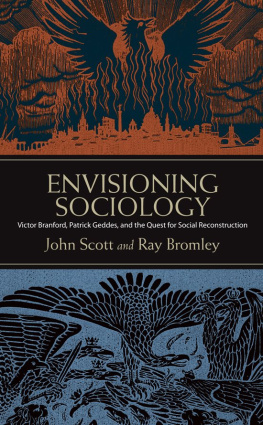John Scott
Essex University, Colchester, UK
Exeter University, Exeter, UK
Sociology Transformed
ISBN 978-3-030-38370-1 e-ISBN 978-3-030-38371-8
https://doi.org/10.1007/978-3-030-38371-8
The Editor(s) (if applicable) and The Author(s), under exclusive license to Springer Nature Switzerland AG 2020
This work is subject to copyright. All rights are solely and exclusively licensed by the Publisher, whether the whole or part of the material is concerned, specifically the rights of translation, reprinting, reuse of illustrations, recitation, broadcasting, reproduction on microfilms or in any other physical way, and transmission or information storage and retrieval, electronic adaptation, computer software, or by similar or dissimilar methodology now known or hereafter developed.
The use of general descriptive names, registered names, trademarks, service marks, etc. in this publication does not imply, even in the absence of a specific statement, that such names are exempt from the relevant protective laws and regulations and therefore free for general use.
The publisher, the authors and the editors are safe to assume that the advice and information in this book are believed to be true and accurate at the date of publication. Neither the publisher nor the authors or the editors give a warranty, expressed or implied, with respect to the material contained herein or for any errors or omissions that may have been made. The publisher remains neutral with regard to jurisdictional claims in published maps and institutional affiliations.
Cover illustration: Pattern adapted from an Indian cotton print produced in the 19th century
This Palgrave Pivot imprint is published by the registered company Springer Nature Switzerland AG.
The registered company address is: Gewerbestrasse 11, 6330 Cham, Switzerland
Preface
This book is far from being a complete institutional and intellectual history of British sociology, a project that would require many lengthy volumes. My aim has been simply to give an introductory overview and to sketch the main themes and ideas that British sociologists have explored, concentrating on the period since 1945. Much of this history will be unfamiliar to many readers, and I hope that this taster will encourage readers to learn more about the history of their own departments and the sociological work that has been undertaken.
British sociology is, in some respects, a loose and ambiguous term. I use it here to refer to the work carried on in British university departments of sociology and cognate subjects by those who have been active in those departments for much of their careers. I therefore include those born and trained elsewhere but who have migrated to Britain and settled here. Conversely, I do not include those born in Britain who have worked overseas for the greater parts of their careers. This is, no doubt, arbitrary, but it provides a workable delineation of the field. For each of the periods covered I first discuss the university and departmental infrastructure of teaching and research and then follow this with a discussion of the principal intellectual trends. It should be possible for the reader to use the index to map the intellectual work back to the departments in which it was undertaken. My accounts of research and my listing of individual sociologists are necessarily selective, and I hope that I will be forgiven by those whose work I fail to mention.
I have made use of the few existing historical accounts wherever possible, but much of the information comes from obituaries, prefaces, acknowledgements, and footnotes in a variety of sources that cannot be listed in the Bibliography without extending this to unreasonable lengths. I have included much information from my personal knowledge and that of various friends and correspondents, to all of whom I am very grateful. I am also grateful to my editors, John Holmwood and Stephen Turner, for comments on an earlier draft. I will be glad to hear of any corrections that need to be made.
In presenting my account I have frequently referred to people by their personal name or the short name by which they were widely known in the profession. I hope that this gives a more intimate and inclusive picture than would be the case if I referred to them all by their full name. Cross-checking with the Bibliography and Index will connect up all name variants. I have not followed this strategy in the case of the early pioneers discussed in Chap., as it was more usual at the time for colleagues to refer to each other by surname alone. While Patrick Geddes was known to his friends as Pat and Leonard Hobhouse to his friends as Leo, it seems more natural to refer to them in full. This, I am sure, involves some inconsistencies for which I apologise.
I have generally referred to universities simply by their geographical location wherever this involves no ambiguity or confusion. Thus, for example, Essex University is referred to simply as Essex, as is common in discussions among colleagues.
The citations included in the Bibliography are to publications by academics working in Britain only, in line with the above delineation of my field. Where it is necessary to refer to sources by writers outside Britain, these are given in full in the footnotes. I have not sought to give full references to the US, French, and German sociologists that are mentioned in passing.
I hope that this book will convey, and share, some of the enthusiasm and commitment that I feel for the subject that I have studied for the last 50 years, though not quite for the whole of the period covered by this history!
John Scott
Colchester, UK
November 2019

















